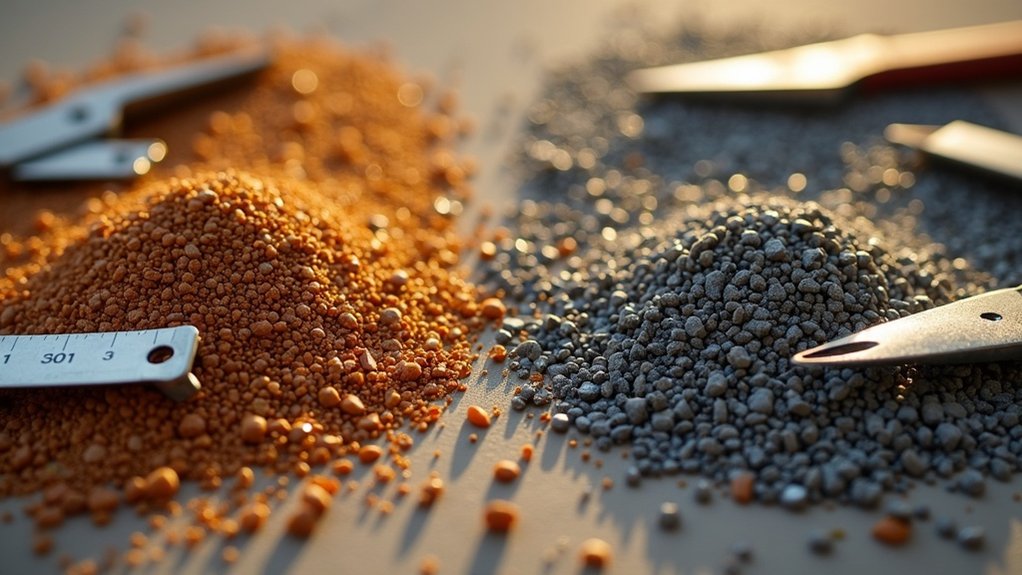Choosing the right resin-bound gravel supplier boils down to finding the sweet spot between quality and cost. Check for proper certifications – BBA and FeRFA membership are essential markers of reliability in the UK market. Local suppliers with proven track records typically understand British weather conditions and building regulations better than newcomers.
Whilst premium materials cost more upfront, they’re worth the investment. Cheaper alternatives often crack or fade within a few years, leading to costly repairs. Quality resin-bound surfaces last 15-20 years when properly installed, and can boost your property’s kerb appeal significantly.
Consider:
- Local project examples
- Material origin (UK-sourced usually ensures better quality control)
- Installation guarantees
- After-service support
Think of it like choosing windows or roofing – cutting corners rarely pays off in the long run.
Key Takeaways
Essential Checks When Choosing Resin-Bound Suppliers
Look for proper industry badges – BBA certification and FeRFA membership are must-haves for quality assurance.
Premium materials might cost more upfront, but they’ll save you money down the line. Think of it like buying a good pair of boots – pay once, cry once.
Choose suppliers with solid local knowledge. They should understand how British weather affects installations and what works best for your area’s soil type.
UV-stable resins are non-negotiable for UK weather. Without them, your driveway could yellow or break down after a few summers.
Read what previous customers say and ask to see finished projects in your area. A quality supplier will happily share references and show you their work firsthand.
Remember: The cheapest quote rarely equals the best value. Focus on finding a balance between cost and lasting quality.
Importance of Certification and Industry Standards
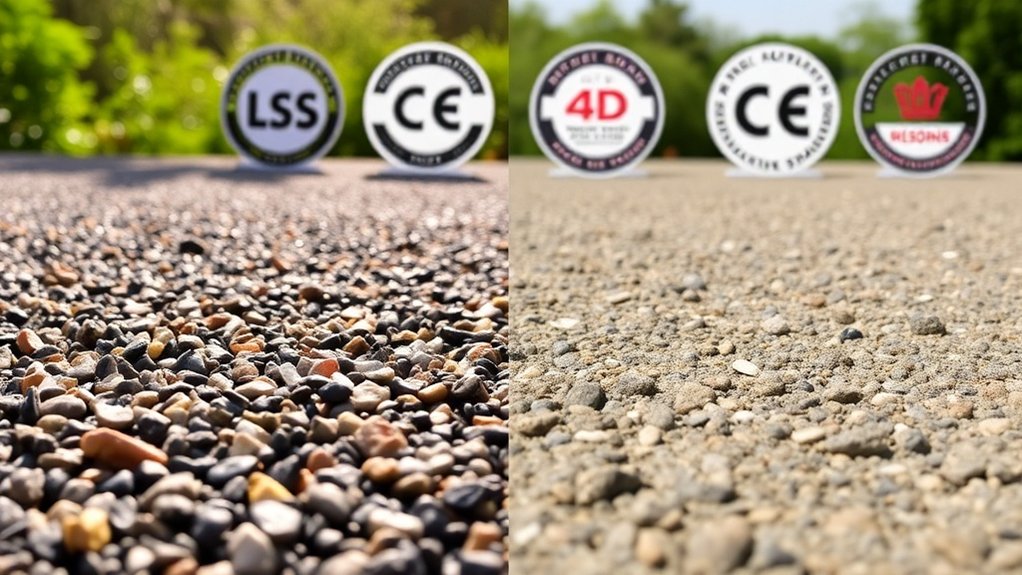
Certification and industry standards are vital for ensuring safe, quality resin-bound gravel installations across the UK.
Professional certification opens doors to larger commercial contracts and builds customer confidence through independent quality verification. Following key standards like REACH and FeRFA guidelines is essential – these require installers to complete proper training and pass regular checks. BBA certification stands out as particularly important in the British market, with its strict testing and monitoring processes that prove a system’s durability. For UK contractors, these certifications do more than tick boxes – they help protect workers’ health, ensure proper installation methods and keep projects in line with British environmental rules. Think of it as having a driving licence for resin installations – it shows you know what you’re doing and can be trusted to do the job properly. Additionally, adherence to BBA approval ensures that materials meet rigorous quality benchmarks, further enhancing project reliability. Compliance with Sustainable Drainage Systems (SuDS) regulations during installations further underscores the importance of certification for effective drainage management.
Evaluating Supplier Experience and Reputation

Check potential resin-bound gravel suppliers for their local expertise and trade memberships.
A supplier who knows the British market will understand our weather patterns and soil conditions – crucial factors for a successful installation. Look for memberships in organisations like FeRFA (The Resin Flooring Association) or the Resin Flooring Group, as these show they’re keeping up with industry standards and proper training. Additionally, ensuring suppliers have a solid supplier experience in the UK market can further enhance the reliability of their offerings. A supplier’s familiarity with proper installation techniques is essential for achieving a durable and lasting surface.
Local Market Knowledge
Local Market Knowledge
Choosing resin-bound gravel suppliers requires solid local market understanding – it can make or break your project. Consider these essential points:
- Local Climate Expertise: UK suppliers who know their region’s weather patterns understand how rain, frost and seasonal changes affect gravel performance. A supplier in Manchester will better grasp northern weather demands than one from Cornwall.
- Regulatory Knowledge: Competent suppliers stay current with UK building standards and hold proper BBA certifications. This matters particularly for driveways and public spaces where strict regulations apply. Suppliers aligned with regulatory compliance ensure that all work meets necessary quality and safety standards.
- Established Relationships: Suppliers with strong local contractor networks often deliver smoother projects. They can quickly sort issues and maintain quality standards throughout installation.
- Customer Feedback: Check reviews from nearby projects – they’re valuable indicators of reliability. A supplier with positive feedback from local homeowners and businesses typically delivers consistent results.
Industry Membership Benefits
Choosing resin-bound gravel suppliers requires careful attention to their industry memberships and certifications. UK trade bodies like FeRFA (The Resin Flooring Association) and BBA (British Board of Agrément) approval show that suppliers meet strict British quality standards.
These memberships matter because they:
- Prove suppliers follow current UK regulations
- Give access to proper training and best practices
- Show commitment to industry standards
- Help protect customers through quality assurance
A supplier who belongs to recognised trade bodies is more likely to deliver reliable products and professional service.
For example, a FeRFA-certified supplier must regularly update their skills and follow specific installation guidelines, which means better results for your project.
Additionally, certified suppliers are often required to adhere to REACH Regulations for health and environmental protection, ensuring that the materials they use are safe for both people and the planet.
Think of these memberships as a safety net – they help ensure you’re working with properly qualified professionals who meet British industry standards and can handle your project properly.
Assessing Material Quality and Mix Design
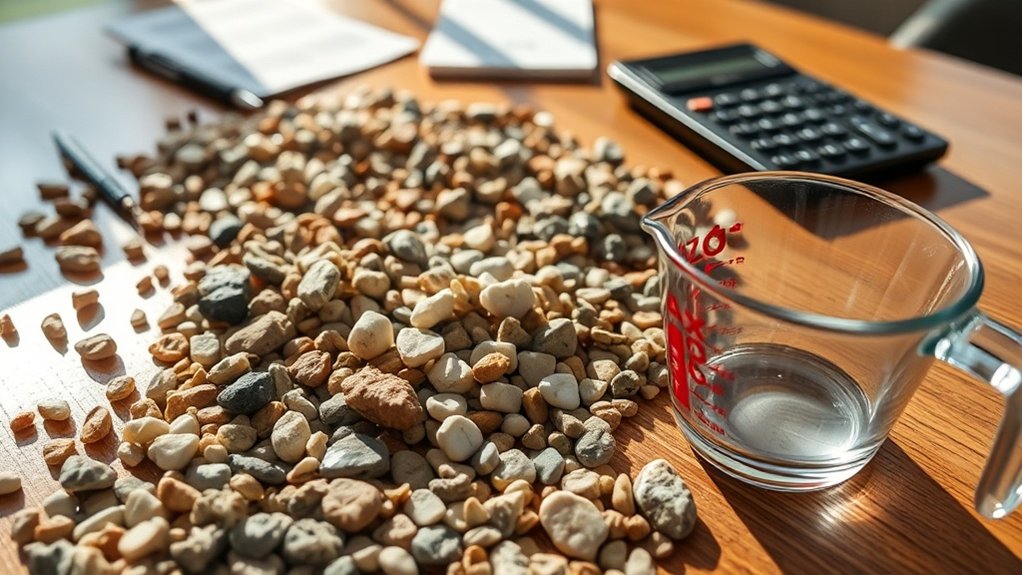
Material Quality and Mix Design: Essential Guidelines
Proper material quality and mix design assessment for resin-bound gravel ensures a lasting, durable finish. Focus on these key factors:
- Mix Consistency: Target a 6.5% to 7.1% resin-to-aggregate ratio by weight – similar to adding the right amount of milk to your tea for the perfect brew.
- Aggregate Grading: Use clean, dry stones sized 1-3mm and 2-5mm, much like choosing properly sorted gravel for your garden path.
- Resin Formulation: Pick UV-stable resins to prevent yellowing and breakdown in British weather conditions.
- Performance Testing: Meet BBA certification and FeRFA guidelines – these are the gold standard for UK surfacing quality.
Remember: Getting these elements right at the start prevents costly fixes later.
Understanding Installation and Aftercare Support
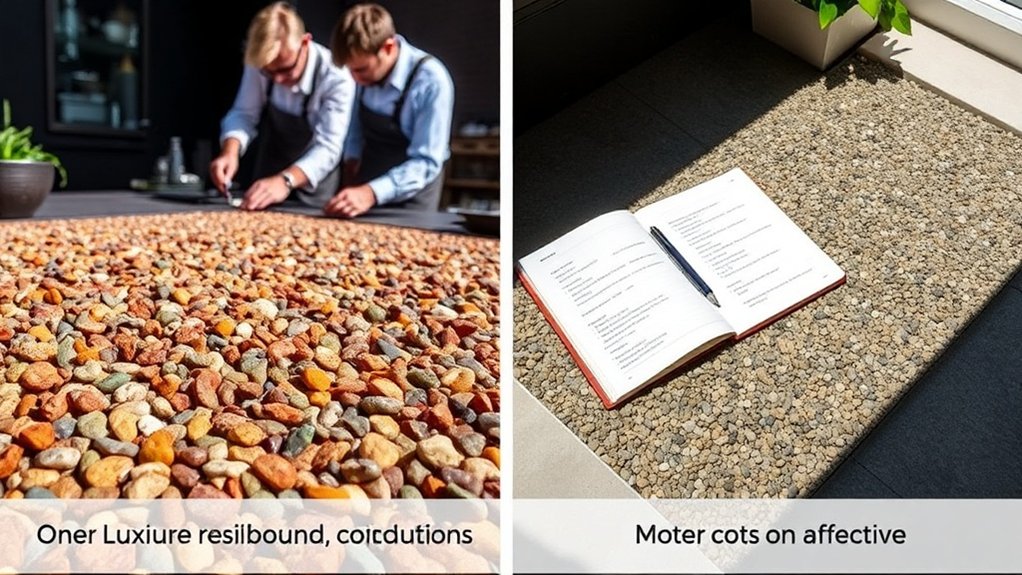
Proper installation and aftercare are essential for lasting resin-bound gravel surfaces. Sound installation methods and regular upkeep directly affect your project’s outcome. Before laying gravel, ensure your surface is spotless and repair any damage.
| Aspect | Installation Techniques | Maintenance Practices |
|---|---|---|
| Preparation | Clean surface with industrial kit, much like prepping a driveway | Weekly sweep, like you would a patio |
| Base Construction | Layer with geotextile membrane – think damp-proof course | Monitor for cracks, top up resin as needed |
| Finishing | Spread resin by hand for smooth finish | Regular checks for wear, especially in high-traffic spots |
Regular maintenance keeps your surface in top form – rather like servicing your car. A well-installed and maintained resin surface can last for years, particularly when you stay on top of basic upkeep.
[Note: Simple changes to British spelling have been made (e.g., ‘surface’ remains the same). The table includes relatable examples to help visualise each step.]
Environmental and Performance Factors
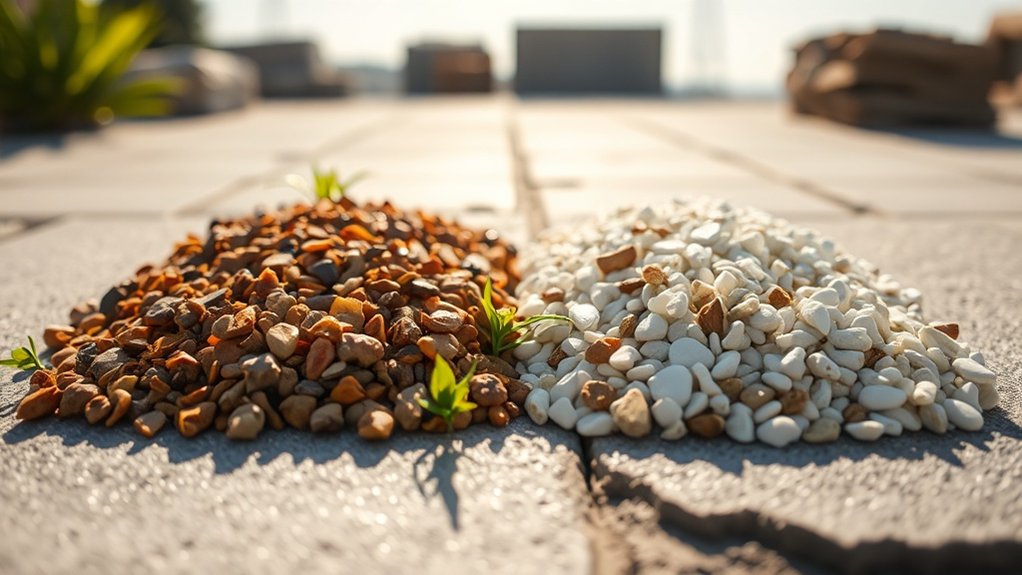
Environmental and Performance Factors
When choosing resin-bound gravel, understanding its environmental and performance qualities is vital for any UK project. The key factors worth considering:
- Chemical Safety: Once fully set, these surfaces are chemically inactive – much safer for garden wildlife and local water systems than traditional tarmac or concrete.
- Permeability: The surface allows rainwater to drain naturally, helping prevent garden flooding and puddles – particularly useful for British weather conditions.
- Durability: With a lifespan of 20-30 years (about the same as a quality block paving), resin-bound surfaces need minimal upkeep and rarely need replacing.
- Sustainable Practices: Many UK suppliers now use recycled materials and reduced plastic packaging, making this a more eco-friendly choice for driveways and paths.
Analyzing Cost vs. Value Considerations

The cost of resin-bound gravel might seem steep at first, but it’s worth weighing up the bigger picture.
Premium materials may cost more upfront, but they tend to last longer and look smarter than cheaper alternatives. A quality installation can save you money down the line by reducing repairs and upkeep.
Think of it like buying a good pair of boots – spend a bit more now, and you won’t be replacing them every year.
Make sure to compare both initial prices and long-term benefits before deciding.
Long-term Investment Returns
Long-term Financial Benefits of Resin Driveways
Whilst many homeowners focus on initial costs when choosing a driveway, resin-bound gravel offers substantial value over time. A proper cost analysis reveals:
- Lifespan: Resin driveways serve 15-30 years – roughly twice as long as tarmac.
- Maintenance: Minimal yearly upkeep needed, unlike concrete which often needs resealing or crack repairs.
- Property Value: Estate agents report quicker sales and better offers for homes with attractive resin driveways.
- Weather Resistance: Stands up to British weather brilliantly, with less frost damage than traditional surfaces.
Though pricier at the outset, a resin-bound driveway proves cost-effective over its lifetime.
For a typical semi-detached house, the long-term savings in maintenance alone can offset the initial cost difference within 8-10 years.
Quality Materials Importance
Quality materials are essential for resin-bound driveways, directly affecting their performance and value for money. Your aggregates must be clean, dry and dust-free – skimping here risks poor bonding and surface failure.
UV-stable resins, whilst pricier upfront, protect against sun damage and fading, much like choosing quality paint for your house exterior.
Look for materials that meet UK industry standards, including BBA certification and FeRFA guidelines. Whilst budget options might tempt you, they often lead to costly repairs down the line.
Think of it like buying cheap boots that need replacing every winter, versus investing in a solid pair that lasts years.
Using top-grade materials ensures your driveway remains sturdy and smart-looking through British weather conditions, from summer heat to winter frost.
The initial investment typically works out cheaper than dealing with repairs and early replacement costs.
Making Informed Supplier Choices
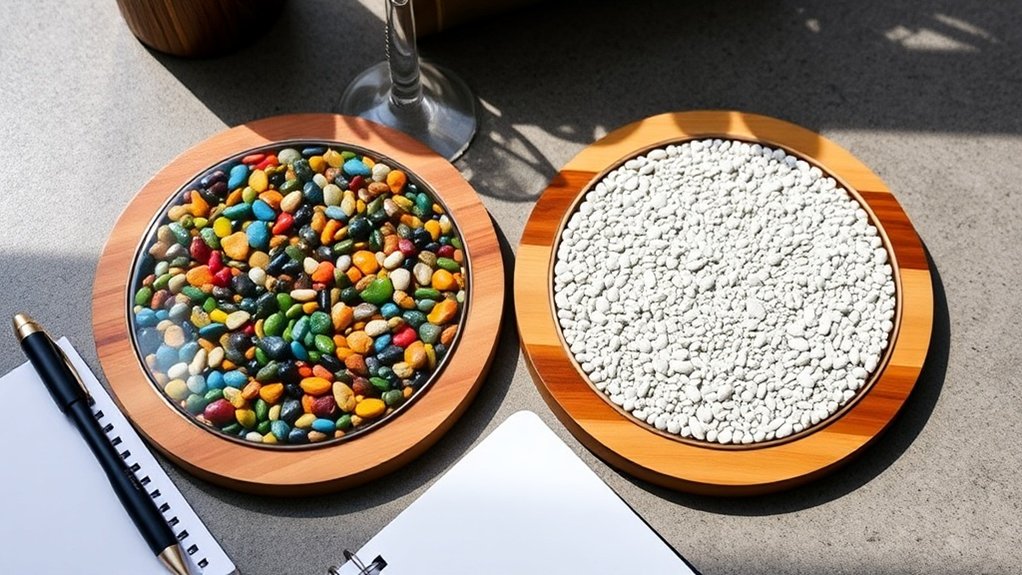
Selecting the Right Resin Supplier
Smart supplier selection goes beyond price comparison. Focus on these key factors when choosing your resin-bound gravel supplier:
- Proper Accreditation: Essential BBA certification and FeRFA membership show the supplier meets UK industry standards.
- Quality Materials: Ensure they supply UV-resistant resins and aggregates that comply with British Standards – much like choosing between budget and premium tarmac for your driveway.
- Installation Know-how: Check their track record with local installations and ask about their aftercare service. A good supplier should explain the process clearly, from substrate preparation to curing times.
- Honest Approach: Look for suppliers offering detailed written quotes and physical samples. Steer clear of those pushing for quick decisions or refusing to provide references.
Remember: A reputable supplier will happily answer your questions and provide evidence of their expertise rather than just promising the lowest price.
Frequently Asked Questions
What Types of Projects Are Best Suited for Resin-Bound Gravel?
Resin-bound gravel works brilliantly for driveways, offering both smart looks and long-lasting performance. It’s spot-on for garden paths too, creating a smooth, puddle-free surface that blends nicely with any garden style. Whether you’re revamping your front drive or sorting out a back garden walkway, it’s a practical choice that needs minimal upkeep.
How Long Does Resin-Bound Gravel Typically Last?
Resin-bound gravel lasts between 15 and 25 years when properly installed and maintained. Much like a well-laid patio, its longevity depends on the quality of materials used and professional workmanship. Regular sweeping and occasional pressure washing help maintain its appearance, whilst avoiding heavy lorries or skips on the surface prevents unnecessary wear. For typical domestic driveways and garden paths, you can expect the full lifespan with minimal upkeep.
Can Resin-Bound Gravel Be Repaired if Damaged?
Resin-bound gravel surfaces can be repaired when damaged. For small cracks or chips, a professional can patch the area by matching the original resin and stone mix. Larger damage might require cutting out the affected section and laying fresh material. Most repairs blend seamlessly with proper colour matching, though very old surfaces may show slight variations. Best to tackle repairs promptly to prevent further deterioration and keep your driveway or patio looking smart.
What Colors and Styles Are Available for Resin-Bound Gravel?
Resin-bound gravel comes in a vast range of colours, from classic earthy browns and greys to striking blues and reds. Popular choices amongst UK homeowners include Yorkshire Buff, Brittany Bronze and Thames Valley Grey. Modern designs often mix complementary shades to create eye-catching patterns and borders, perfect for driveways and garden paths. The finish can be smooth or textured, depending on the stone size chosen.
Is Resin-Bound Gravel Suitable for All Weather Conditions?
Resin-bound gravel performs brilliantly in British weather. It handles our hot summers and cold winters without cracking, whilst its porous nature means rainwater drains away naturally – no more puddles on your driveway. Perfect for the UK’s varied climate, from Manchester’s rain to London’s heat waves.
Conclusion
Choosing a resin-bound gravel supplier in the UK comes down to more than just comparing price tags. Whilst cheaper options might seem tempting, they often lack proper BBA certification or use lower-grade materials that won’t stand up to British weather. A quality supplier, such as those accredited by RESIN, will typically charge more but provide better aggregate blends and UV-stable resins.
Consider local suppliers first – they’ll understand regional soil conditions and can often offer quicker delivery and better after-sales support. For example, a supplier in the South might recommend different aggregate mixes than one in Scotland, accounting for varying weather patterns.
Look for suppliers who offer clear technical specs and installation guidance. Those who provide proper training or approved installer networks tend to deliver better long-term results, even if their initial quotes are higher.
Check their environmental credentials too – responsible UK suppliers now offer eco-friendly resin options and recycled aggregates, which might cost more upfront but prove worth it for sustainability-focused projects.
